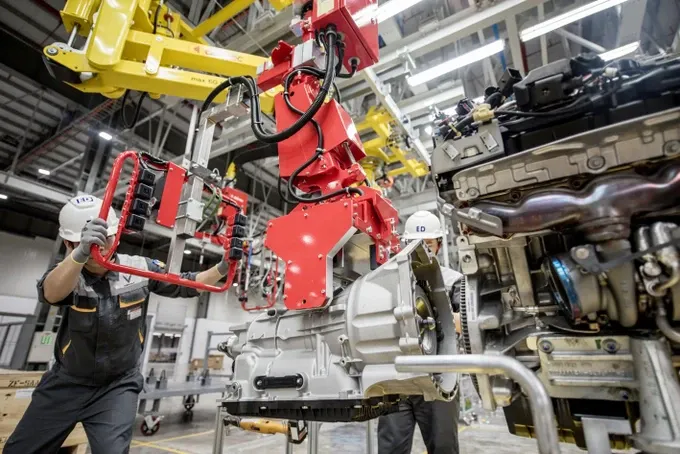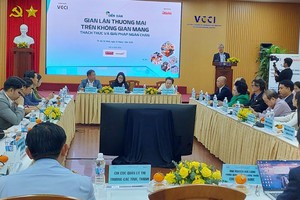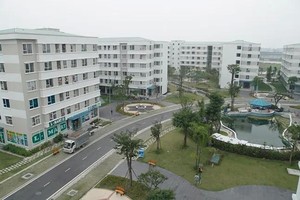The draft plan for the development of the private economy is being finalized, while the Politburo's Resolution No. 68-NQ/TW on private economic development is bringing new expectations thanks to a renewed mindset and breakthrough solutions to raise confidence and generate new driving force for the private economy.
Breakthrough of breakthroughs

Firstly, the right mindset, raising confidence, and creating new momentum are factors for the development of the private economic sector. The private economy is recognized as the most crucial driving force. This new perspective is strongly encouraging entrepreneurial spirit and will pave the way for a new breakthrough, according to Associate Professor Dr.Tran Dinh Thien, former Director of the Vietnam Institute of Economics.
Resolution No. 68-NQ/TW inspires confidence and national aspiration, creating new momentum and a new spirit for the development of the private economic sector. Currently, millions of business households lack the motivation to transition into enterprises due to concerns over burdens in administrative processes, legal risks, and limited management capacity. Therefore, it is essential to strengthen business households' trust and the aspiration to rise and develop into enterprises, and existing enterprises can continue to grow. In addition, the private sector has yet to enjoy a level playing field in accessing essential resources, founder and chairman of Imex Pan Pacific Group (IPPG) Johnathan Hanh Nguyen said.
According to several experts, Vietnam has implemented institutional reform over the past 13 years, primarily focusing on administrative procedure reform and improving the business environment. However, institutions are still regarded as “the bottleneck of all bottlenecks.” Therefore, it needs reform that becomes the “breakthrough of all breakthroughs,” creating a turning point for private sector development, contributing to implementing two goals, including becoming an upper-middle-income country by 2030 and a high-income developed country by 2045.
According to Dr. Nguyen Dinh Cung, former director of the Central Institute for Economic Management, it must complete a comprehensive review and remove unnecessary business conditions and overlapping and inappropriate regulations hindering the development of private enterprises; cut administrative procedure processing time and business costs (compliance costs) by at least 30 percent, while also reducing 30 percent of unnecessary business conditions in accordance with Resolution 68-NQ/TW.
Unlocking resources
Lawyer Nguyen Hong Chung, Vice Chairman of the Vietnam Industrial Park Finance Association, proposed that it needs to ensure equal access to the nation's resources and assets. The private economic sector should be offered chances to access favorable jobs and business opportunities conveniently, accessibly, and appropriately. Administrative procedures must be simplified to reduce time and compliance costs, aimed at making business establishment as simple, convenient, and rapid as possible.
Associate Professor Dr.Tran Dinh Thien, former Director of the Vietnam Institute of Economics, emphasized that many supporting policies and solutions for businesses and the development of the private sector have gained practical achievements over the past several decades. However, there are still limitations. Businesses need a tiered support policy tailored to different groups of enterprises, both large and small, not only simplifying procedures but also offering tax incentives for enterprises in their first three years.
Strict and effective implementation of Resolution No. 68-NQ/TW will eliminate the current situation where enterprises are neither truly free to operate in sectors not prohibited by law nor conduct business in sectors as regulated by law. The resolution affirms that citizens and enterprises have the freedom to do business in any field not forbidden by law; it aims to remove administrative barriers, eradicate the “ask-give” mechanism, and a persistent mindset among some State agencies that 'if it cannot be managed, then ban it'.
Dr. Nguyen Duc Kien, former Head of the Prime Minister’s Economic Advisory Group, analyzed that the economy has three main pillars, including the state-owned sector, the foreign-invested sector, and the private sector. Over the previous two decades, particularly since the Politburo issued Resolution No. 09-NQ/TW dated December 9, 2011, on building and promoting the role of Vietnamese entrepreneurs in the period of accelerating industrialization, modernization, and international integration, and Resolution 10-NQ/TW on June 3, 2017, on developing the private economy into an important driving force of the socialist-oriented market economy, the private sector has grown vigorously and become one of the key pillars of the economy and increasingly demonstrated itself as one of the most crucial driving forces of national economic growth.
Vietnam already has strong enterprises at a regional scale, but their number is still limited. The private sector still consists mostly of small, micro-sized businesses and business households. There is still a lack of private manufacturing firms deeply integrated into global value chains, which limits business efficiency and the ability to participate in global product value chains. At present, it is expected that the private sector will be an important driving force for the economy to achieve double-digit growth. Policies for the private sector should also be segmented by groups. In particular, special attention should be paid to the 20 million farming households, especially agricultural industrialization, collective economy models, and land accumulation, Dr. Nguyen Duc Kien noted.
It is essential to thoroughly grasp and decisively, comprehensively, and effectively implement Resolution No. 68-NQ/TW. Additionally, the National Assembly and Government agencies must renew the implementation of breakthrough policies from the Party’s resolutions and directives to create a breakthrough to enter a new era of national rise, he added.
Prime Minister Pham Minh Chinh, Head of the national steering committee for building the private economic sector development project, emphasized that resources come from mindset and vision, motivation comes from innovation and creativity, and strength originates from the people and businesses. It needs to believe in the private sector, create growth drivers, and encourage enterprises and people to develop production and business to generate social value and create the wealth and prosperity of their families and the nation.
























